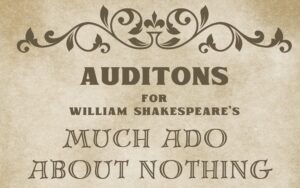Spring Production Auditions
AUDITION ANNOUNCEMENT
Much Ado About Nothing
Much Ado weaves a tapestry of laughter, romance, and deception. Join the quick-witted Benedick and equally sharp Beatrice as they engage in a verbal wrestling match that conceals their hidden passion, while the young Hero and naive Claudio navigate the twists of new love.
Note that this production is not going to be one of those stuffy plays that invariably put people off Shakespeare. It’ll be modern, fun, and playful. So come out and play with us!
When: October 28 at 4:00 pm, October 29 at 6:00 pm
Where: Jefferson State – Pell City Campus, room 105
Who Can Audition? All actors 16 to 99 are encouraged to audition.
What to Prepare: Rehearse one of the Shakespearean monologues below or select a 60- to 90-second Shakespearean monologue of your choosing. Memorization is not required.
Auditions will include readings from the script, so be familiar with the plot and characters by reading the play (or a synopsis) or by watching a production on YouTube.
What to Bring: Print and fill out the Audition Form. Please be sure to include all scheduling conflicts.
Rehearsals: Begin November 9. All rehearsals will be held in Pell City. We will primarily rehearse on Tuesdays and Thursdays from 6:00 to 10:00 pm and Saturdays from 10:00 to 2:00 pm. A few breaks will be given to observe the Thanksgiving and Christmas holidays.
Performances: February 7 – 9
Roles
All roles are available. The Pioneer Players embrace genderless and color-blind casting.
DON PEDRO, Prince of Arragon.
DON JOHN, Don Pedro’s bastard Brother.
CLAUDIO, a young Lord of Florence.
BENEDICK, a young Lord of Padua.
LEONATO, Governor of Messina.
ANTONIO, Leonato’s Brother.
BALTHASAR, Servant to Don Pedro.
BORACHIO, follower of Don John.
CONRADE, follower of Don John.
DOGBERRY, a Constable.
VERGES, a Headborough.
FRIAR FRANCIS
A Sexton
A Boy
HERO, Daughter to Leonato.
BEATRICE, Niece to Leonato.
MARGARET, Waiting gentlewoman attending on Hero.
URSULA, Waiting gentlewoman attending on Hero.
Messengers, Watch, Attendants, etc.
Audition Monologues
(be sure to look up the meanings of the words and phrases)
Twelfth Night
Viola:
I left no ring with her: what means this lady?
Fortune forbid my outside have not charm’d her!
She made good view of me, indeed so much,
That sure methought her eyes had lost her tongue,
For she did speak in starts distractedly.
She loves me, sure; the cunning of her passion
Invites me in this churlish messenger.
None of my lord’s ring? Why, he sent her none.
I am the man: if it be so, as ’tis,
Poor lady, she were better love a dream.
Disguise, I see thou art a wickedness,
Wherein the pregnant enemy does much.
How easy is it for the proper false
In women’s waxen hearts to set their forms!
Alas, our frailty is the cause, not we,
For such as we are made of, such we be.
How will this fadge? My master loves her dearly;
And I, poor monster, fond as much on him,
And she, mistaken, seems to dote on me:
What will become of this? As I am man,
My state is desperate for my master’s love:
As I am woman (now alas the day!)
What thriftless sighs shall poor Olivia breathe?
O time, thou must untangle this, not I;
It is too hard a knot for me t’untie.
Two Gentlemen of Verona
Launce:
I think Crab, my dog, has the sourest personality of any dog alive. Even with my mother weeping, my father wailing, my sister crying, our maid howling, and our cat wringing her hands, this cruel-hearted mutt didn’t shed a single tear. Why, my grandmother—who doesn’t have use of her eyes, you see—cried herself blind when I said goodbye. No, I’ll demonstrate what happened. This shoe represents my father. No, this left shoe is my father. No, no, this left shoe is my mother. No, that can’t be right either. Yes it is, it is—it has the sole that isn’t as good. This shoe, with the hole in it, is my mother, and this one is my father. Take that! That’s right now. Now, sir, this wooden stick is my sister, because, you see, it is as white as a lily and as thin as a twig. This hat is Nan, our maid. I am the dog. No wait, the dog is himself, and I am the dog—oh, I mean, the dog is me, and I am myself. Okay, okay, that’s it. Now I go to my father and say, “Father, give me your blessing.” Now the shoe can’t say a word because it’s crying so hard. Now I’ll kiss my father. Well, he keeps crying. Now I come to my mother. Oh, I wish this shoe could speak full of emotion now! Well, I kiss her. And that’s the way it happened. Here’s how she breathed from crying so much. Now I come to my sister. Listen to the moans she makes because she’s so sad. All the while the dog doesn’t shed a single tear or speak a word. See how I flatten the dust with my tears?
The Taming of the Shrew
Petruchio:
She eat no meat to-day, nor none shall eat;
Last night she slept not, nor to-night she shall not;
As with the meat, some undeserved fault
I’ll find about the making of the bed;
And here I’ll fling the pillow, there the bolster,
This way the coverlet, another way the sheets:
Ay, and amid this hurly I intend
That all is done in reverend care of her;
And in conclusion she shall watch all night:
And if she chance to nod I’ll rail and brawl
And with the clamour keep her still awake.
This is a way to kill a wife with kindness;
And thus I’ll curb her mad and headstrong humour.
He that knows better how to tame a shrew,
Now let him speak: ’tis charity to show.
Two Gentlemen of Verona
Julia:
O hateful hands, to tear such loving words;
Injurious wasps, to feed on such sweet honey,
And kill the bees that yield it, with your stings!
I’ll kiss each several paper for amends.
Look, here is writ ‘kind Julia.’ Unkind Julia!
As in revenge of thy ingratitude,
I throw thy name against the bruising stones,
Trampling contemptuously on thy disdain.
And here is writ ‘love-wounded Proteus’.
Poor wounded name: my bosom, as a bed,
Shall lodge thee till thy wound be thoroughly heal’d;
And thus I search it with a sovereign kiss.
But twice, or thrice, was ‘Proteus’ written down:
Be calm, good wind, blow not a word away,
Till I have found each letter, in the letter,
Except mine own name: that some whirlwind bear
Unto a ragged, fearful, hanging rock,
And throw it thence into the raging sea.
Lo, here in one line is his name twice writ:
‘Poor forlorn Proteus’, ‘passionate Proteus’.
‘To the sweet Julia’: that I’ll tear away.
And yet I will not, sith so prettily
He couples it to his complaining names.
Thus will I fold them one on another:
Now kiss, embrace, contend, do what you will.
Love’s Labour’s Lost
Armado:
I do affect the very ground, which is base, where
her shoe, which is baser, guided by her foot, which
is basest, doth tread. I shall be forsworn, which
is a great argument of falsehood, if I love. And
how can that be true love which is falsely
attempted? Love is a familiar; Love is a devil:
there is no evil angel but Love. Yet was Samson so
tempted, and he had an excellent strength; yet was
Solomon so seduced, and he had a very good wit.
Cupid’s butt-shaft is too hard for Hercules’ club;
and therefore too much odds for a Spaniard’s rapier.
The first and second cause will not serve my turn;
the passado he respects not, the duello he regards
not: his disgrace is to be called boy; but his
glory is to subdue men. Adieu, valour! rust rapier!
be still, drum! for your manager is in love; yea,
he loveth. Assist me, some extemporal god of rhyme,
for I am sure I shall turn sonnet. Devise, wit;
write, pen; for I am for whole volumes in folio.
Love’s Labour’s Lost
Princess of France
A time, methinks, too short
To make a world-without-end bargain in.
No, no, my lord, your grace is perjured much,
Full of dear guiltiness; and therefore this:
If for my love, as there is no such cause,
You will do aught, this shall you do for me:
Your oath I will not trust; but go with speed
To some forlorn and naked hermitage,
Remote from all the pleasures of the world;
There stay until the twelve celestial signs
Have brought about the annual reckoning.
If this austere insociable life
Change not your offer made in heat of blood;
If frosts and fasts, hard lodging and thin weeds
Nip not the gaudy blossoms of your love,
But that it bear this trial and last love;
Then, at the expiration of the year,
Come challenge me, challenge me by these deserts,
And, by this virgin palm now kissing thine
I will be thine; and till that instant shut
My woeful self up in a mourning house,
Raining the tears of lamentation
For the remembrance of my father’s death.
If this thou do deny, let our hands part,
Neither entitled in the other’s heart.




